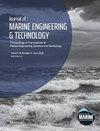The impact of R&D investment on the new orders received by the shipbuilding enterprises under the background of innovation-driven development
IF 4.4
4区 工程技术
Q1 ENGINEERING, MARINE
Journal of Marine Engineering and Technology
Pub Date : 2023-10-11
DOI:10.1080/20464177.2023.2266885
引用次数: 0
Abstract
ABSTRACTUsing the panel data of listed shipbuilding enterprises from 2010 to 2021 all over the world, this paper empirically studies the impact of Research & Development investment on new orders received by shipbuilding enterprises using the panel fixed effect model and the threshold regression model. The results show that R&D investment has a positive impact on the new order of high-tech and high-value-added ships in shipbuilding enterprises. R&D investment has a time lag effect on the new orders and a non-linear relationship with the newly received orders. The 1-year lagged R&D investment has a single threshold effect on the newly received orders of liquid tankers. When the R&D investment intensity exceeds the threshold, the positive impact on the newly received orders is weakened. To be specific, when the excessive R&D investment intensity does not match the scientific research capacity of shipbuilding enterprises, enterprise resources will be mismatched. Therefore, shipbuilding enterprises should increase their investment in R&D if they want to build more high-tech and high-value-added ships. At the same time, enterprises should also pay attention not to blindly strengthen the R&D investment, but to keep it within a reasonable range, so that resources can be allocated appropriately. Disclosure statementNo potential conflict of interest was reported by the author(s).Additional informationFundingThis research was supported by National Natural Science Foundation of China [grant number 42176217], [grant number 71701127]Notes on contributorsYanhui ChenDr. Yanhui Chen obtained her Ph.D. in the Department of Management Sciences from the City University of Hong Kong. She is an associate professor in the School of Economics and Management at Shanghai Maritime University. Her research interests include financial time series analysis and shipping economics.Mengmeng MaMengmeng Ma is a postgraduate student in the School of Economics and Management at Shanghai Maritime University, majoring in shipping finance. Her research interest is shipping economics.Jackson Jinhong MiProf. Jackson Jinhong Mi is a Professor of Maritime Finance and doctoral supervisor in School of Economics and Management at the Shanghai Maritime University. He holds a Ph.D. in Economics and Postdoc in Data Science from Fudan University. His teaching and research interests include the combination of Finance and Maritime Economics as well as structural equation modelling and machine learning.创新驱动发展背景下船舶企业研发投入对新订单的影响
摘要本文利用2010 - 2021年全球船舶上市企业面板数据,运用面板固定效应模型和阈值回归模型,实证研究了研发投入对船舶企业新订单量的影响。研究结果表明,研发投入对造船企业高技术、高附加值船舶新订单产生正向影响。研发投入对新订单有时滞效应,与新订单呈非线性关系。滞后1年的研发投入对液罐车新接订单具有单一阈值效应。当研发投入强度超过阈值时,对新接订单的正向影响减弱。具体来说,当过高的研发投入强度与造船企业的科研能力不匹配时,企业资源就会错配。因此,造船企业要想制造出更多高技术含量、高附加值的船舶,就必须加大研发投入。同时,企业也要注意不要盲目加强研发投入,而是要将其控制在合理的范围内,使资源得到合理配置。披露声明作者未报告潜在的利益冲突。本研究得到国家自然科学基金项目资助[基金号:42176217],[基金号:71701127]。陈艳慧,博士,毕业于香港城市大学管理科学系。她是上海海事大学经济与管理学院副教授。主要研究方向为金融时间序列分析和航运经济学。马梦梦是上海海事大学经济与管理学院的一名研究生,主修航运金融。她的研究兴趣是航运经济学。米金宏教授米金宏,上海海事大学经济与管理学院海事金融学教授、博士生导师。他是复旦大学经济学博士和数据科学博士后。他的教学和研究兴趣包括金融与海事经济学的结合,以及结构方程建模和机器学习。
本文章由计算机程序翻译,如有差异,请以英文原文为准。
求助全文
约1分钟内获得全文
求助全文
来源期刊

Journal of Marine Engineering and Technology
ENGINEERING, MARINE-
CiteScore
6.30
自引率
0.00%
发文量
15
期刊介绍:
The Journal of Marine Engineering and Technology will publish papers concerned with scientific and theoretical research applied to all aspects of marine engineering and technology in addition to issues associated with the application of technology in the marine environment. The areas of interest will include:
• Fuel technology and Combustion
• Power and Propulsion Systems
• Noise and vibration
• Offshore and Underwater Technology
• Computing, IT and communication
• Pumping and Pipeline Engineering
• Safety and Environmental Assessment
• Electrical and Electronic Systems and Machines
• Vessel Manoeuvring and Stabilisation
• Tribology and Power Transmission
• Dynamic modelling, System Simulation and Control
• Heat Transfer, Energy Conversion and Use
• Renewable Energy and Sustainability
• Materials and Corrosion
• Heat Engine Development
• Green Shipping
• Hydrography
• Subsea Operations
• Cargo Handling and Containment
• Pollution Reduction
• Navigation
• Vessel Management
• Decommissioning
• Salvage Procedures
• Legislation
• Ship and floating structure design
• Robotics Salvage Procedures
• Structural Integrity Cargo Handling and Containment
• Marine resource and acquisition
• Risk Analysis Robotics
• Maintenance and Inspection Planning Vessel Management
• Marine security
• Risk Analysis
• Legislation
• Underwater Vehicles
• Plant and Equipment
• Structural Integrity
• Installation and Repair
• Plant and Equipment
• Maintenance and Inspection Planning.
 求助内容:
求助内容: 应助结果提醒方式:
应助结果提醒方式:


